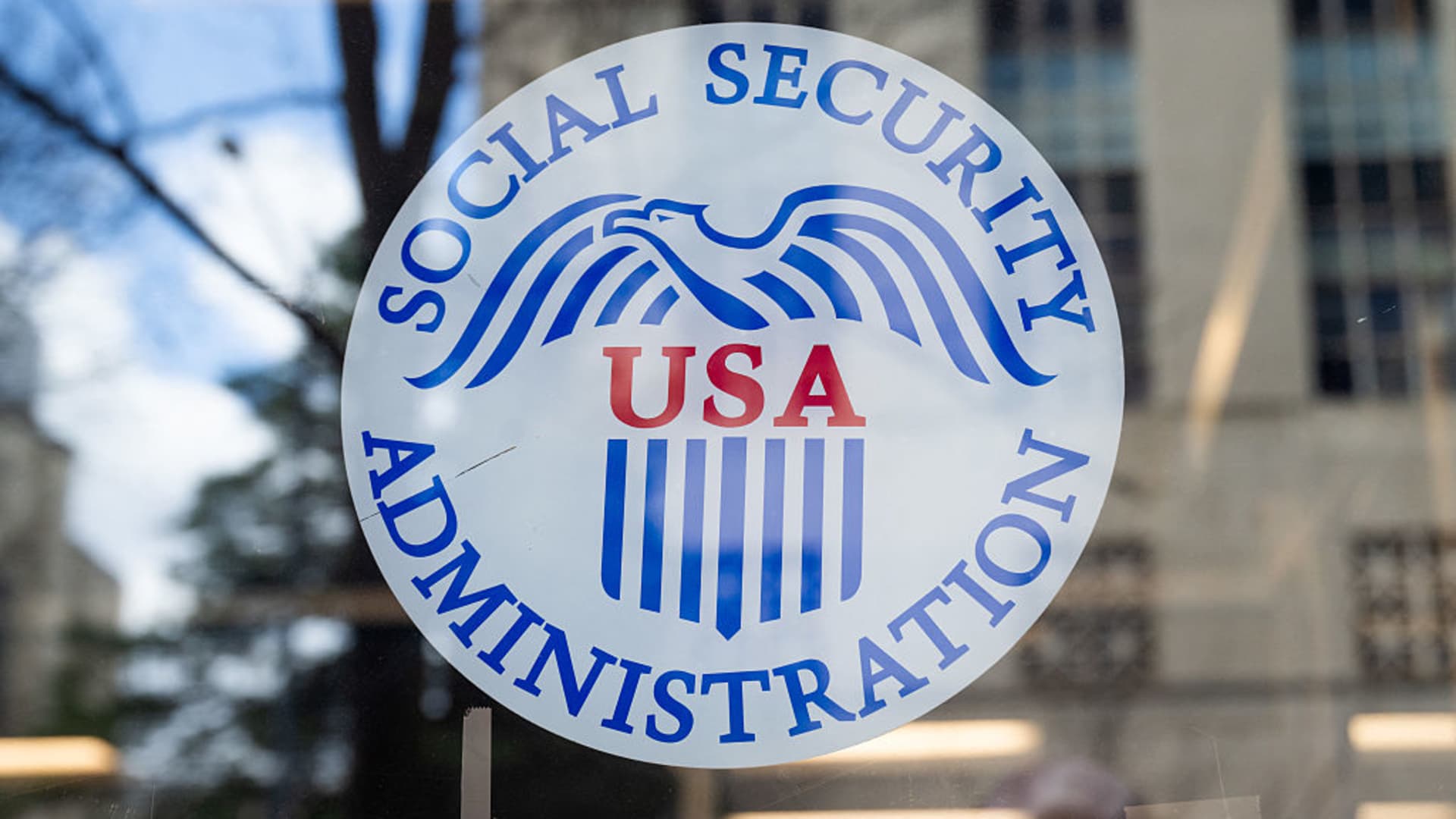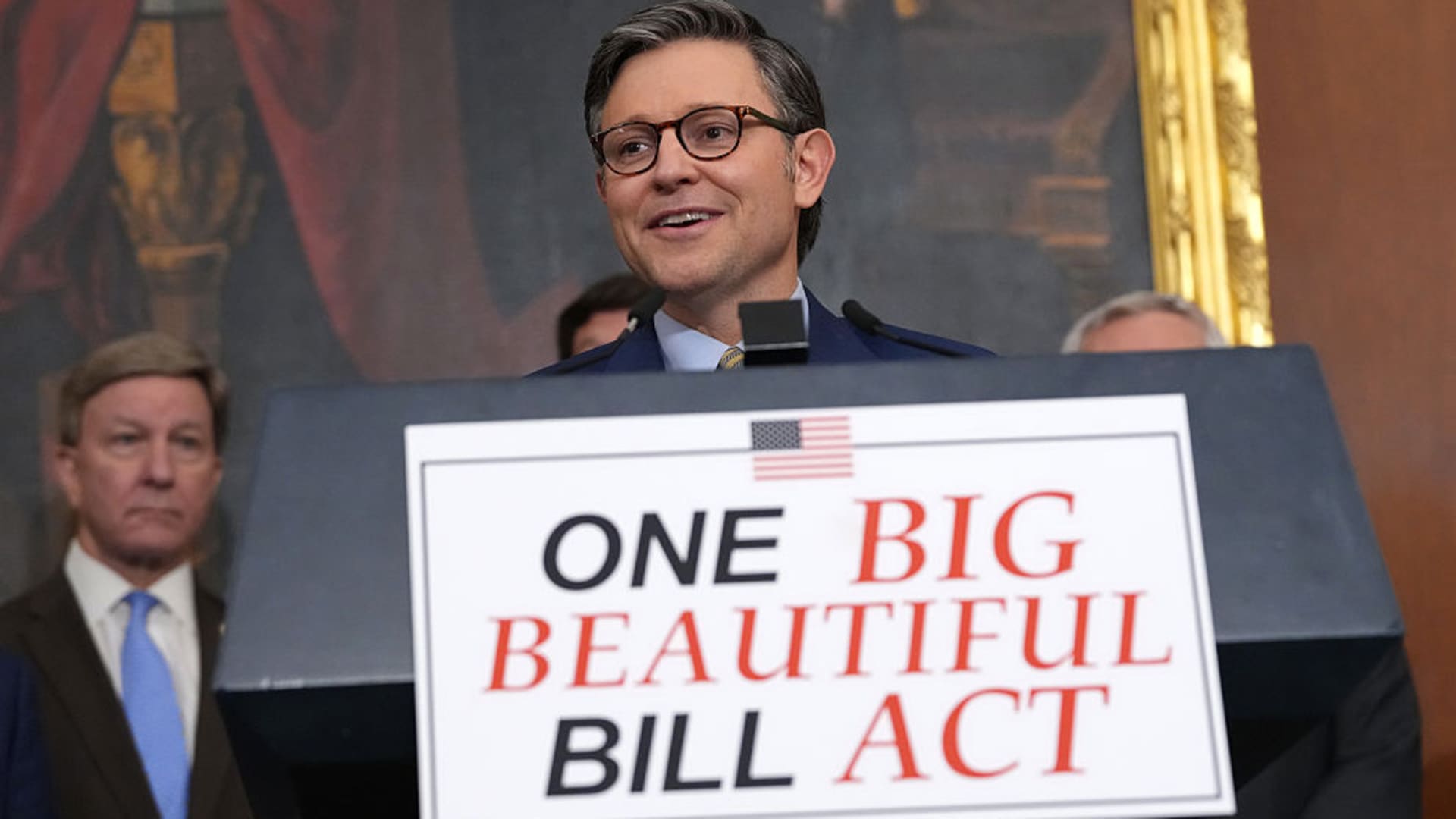A Social Security Administration (SSA) office in Washington, DC, March 26, 2025.
Saul Loeb | Afp | Getty Images
The Social Security Administration has now processed about 91% of cases related to a new law that is prompting higher benefits and lump-sum retroactive payments for nearly 3 million people, according to a new update from the agency.
The Social Security Fairness Act, which was signed into law in January, eliminated two provisions — the Windfall Elimination Provision, or WEP, and the Government Pension Offset, or GPO — that previously reduced benefits for individuals who also receive income from public pensions that did not require the payment of Social Security payroll taxes.
At the start of the year, the Social Security Administration said affected beneficiaries may have to wait more than one year to see their payments adjusted.
More from Personal Finance:
What the House GOP budget bill means for your money
Trump tariffs create the ‘perfect storm’ for scams
Social Security COLA for 2026 projected to be lowest in years
The agency credits automation for helping it to expedite those payments.
The Social Security Administration currently plans to update all beneficiary records affected by the law by early November.
However, the agency is “working to exceed its estimate” under new commissioner Frank Bisignano, a Social Security Administration official said via email.
“Commissioner Bisignano committed to senators during his confirmation process that this would be finished ‘while the weather is warm’ and he will keep his promise,” the Social Security Administration official said.
Here’s the latest on the Fairness Act payments.
Who does the Social Security Fairness Act affect?
The Social Security Fairness Act, which was signed into law on Jan. 5, affects certain individuals who are eligible for Social Security benefits, but who also receive pensions from work that did not require the payment of Social Security payroll taxes.
Examples of those affected include teachers, firefighters and police officers; federal employees covered by the Civil Service Retirement System; and people who are covered by a foreign social security system, according to the Social Security Administration.
Notably, not everyone in those groups will receive a benefit increase, according to the agency. About 72% of state and local public employees pay Social Security taxes, and therefore were not affected by the new law, according to the agency.
The provisions that had previously been in place reduced Social Security benefits for more than 2.8 million people, according to SSA. To date, the agency has processed about 2.5 million cases, the agency said in its latest update.
Railroad Retirement Board beneficiaries also stand to receive adjusted annuity payments because of the law. New monthly annuity amounts for most individuals will begin in July, and one-time retroactive payments are due to arrive by the end of July, according to a Railroad Retirement Board spokeswoman.
How much are the benefit increases?
Individuals affected may see monthly Social Security check increases ranging from “very little” to more than $1,000 per month, according to SSA.
The changes will result in higher monthly payments ranging from $360 to $1,190, depending on individual circumstances, the Congressional Budget Office previously estimated.
Affected beneficiaries will also see lump-sum payments dating back as far back as January 2024. Notably, Social Security benefit payments for January 2024 were received by beneficiaries in February 2024, according to the Social Security Administration.
For each beneficiary, the monthly benefit increases and any back payments are processed together, the Social Security official said.
Who is still waiting for benefit adjustments?
The Social Security Administration is now prioritizing the remaining complex cases that could not be automated, according to the Social Security official.
Those cases require additional time to manually update records to process both the retroactive and new benefits.
The roughly 300,000 individuals who are still waiting may have unique circumstances, notes David A. Weaver, a former Social Security Administration executive who currently teaches statistics at the University of South Carolina.
For example, some eligible beneficiaries who have recently died may qualify for the lump-sum retroactive payments, Weaver said. In those circumstances, the Social Security Administration would likely try to issue that money to survivors.
Others may be affected by overpayments, whereby the Social Security Administration issued benefit payments that were too high. In those cases, the agency will generally seek reimbursement for the excess sums that were issued.
In addition to the cases that require manual processing, there are people who are now newly eligible to apply for Social Security benefits as a result of the law, Weaver said.
Those individuals may need to file an application, according to the Social Security Administration. The date of the application may determine benefit start date and benefit amount.
What could happen next?
As the implementation of the Social Security Fairness Act moves to completion, it may be wise for Congress to ask the Government Accountability Office to audit that process, Weaver said.
That may allow for an evaluation of the final administrative costs for processing the benefit changes due to the law, including both the manual cases and additional new claims, as well as phone calls from the public about the changes, he said.
That investigation could also evaluate whether other agency work was sidelined as the benefit changes were processed, he said.
Have your Social Security benefits been affected by the Social Security Fairness Act? If you would be willing to share your story, email [email protected].


 Economics1 week ago
Economics1 week ago
 Economics1 week ago
Economics1 week ago
 Economics1 week ago
Economics1 week ago
 Personal Finance7 days ago
Personal Finance7 days ago
 Accounting1 week ago
Accounting1 week ago
 Blog Post4 days ago
Blog Post4 days ago
 Economics5 days ago
Economics5 days ago
 Personal Finance7 days ago
Personal Finance7 days ago












